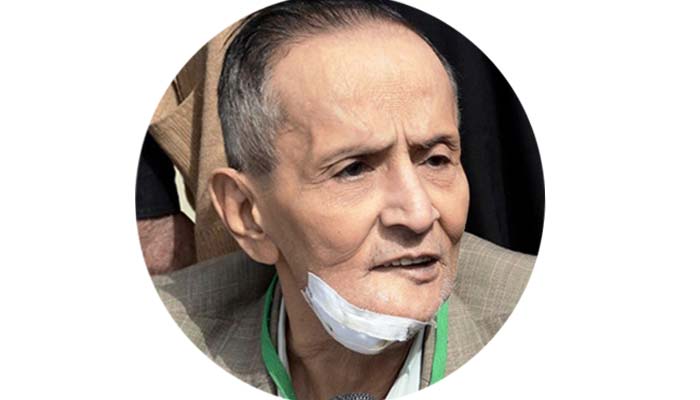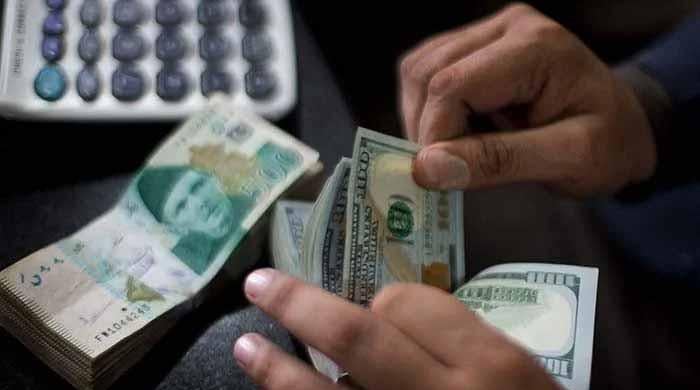Corruption, bribes and a little notebook: The story of Younus Habib
Younus Habib rose from a junior clerk to chief executive of a major bank, becoming one of the most notorious figures in the banking and political circles
May 07, 2019

The small notebook was always with him. In it were details, allegedly, of fictitious bank accounts, land records, and the bribes he had doled out to political and private individuals. This is the story of Younus Habib, who rose from a junior clerk to become the chief executive of a major bank in Pakistan.
Habib passed away last week. He is survived by two daughters, one son and countless stories. A record of these stories, some told and some untold, was found later in his infamous notebook, which had gone missing after his arrest in the 90s from the Karachi airport.
The former president of the Mehran Bank is probably one of the most notorious figure in the banking and political circles. He leaves behind a dark legacy and countless beneficiaries, who were allegedly paid off to manipulate the 1990 general election in Pakistan.
"Bhai, mehne sub ko paisa deye, aur ye sub meri diary mey mujood hain," (I gave money to everyone and the recorded is in my diary), he once told me. Later, I and a friend visited him in jail, after he was convicted for 10 years in a case of fraud and embezzlement. Interestingly, he got out of prison in just three years. There are speculations that he got out early by paying off the jailer.
After every exchange, Habib would write down the name of the person he gave the money to and in front of it he would note down the exact amount given. “Bhai, hisab pura rakha hai, ab koi maney ya na maney,” (I have kept a complete record, whether one admits it or not), he also told me.
After being released, the banker would sit at his office on I. I. Chundrigar road in Karachi, till his health started deteriorating few years back.
Many have dubbed Habib as the “father of benami accounts” and parallel banking in Pakistan. His power can be determined by the fact that the then-home secretary, Wajid Rana, had prepared a report against him, listing how he dubiously got his jail sentence reduced by two years using two different blood samples to fake an illness. Yet, the report was ignored and he was freed from prison.
By 1994, Habib had a reputation, and a bad one. The then-Interior Minister, Major-General (r) Naseerullah Khan Babar, named him as a key figure in the Mehran Bank scandal and the benami accounts case, which later became the famous Asghar Khan case. Khan, a retired air marshal, had written a letter to the chief justice of the supreme court to investigate whether the premier intelligence agency had a “political cell” or not. When I interviewed the CJ, he disclosed that his findings had established that there was indeed a case to be pursued against those accused by Khan, but he could not announce the verdict due to the military coup of 1999.
Today, both Khan and Habib are no more. But the case refuses to die. The statements of the accused and the accusers are on the record. Although, it is still a mystery where and who discovered Habib’s loaded notebook.
Interestingly, Habib had also kept audio-records of his conversations. Journalist Kamran Khan broke the news, and I later wrote about the existence of the tapes. The story was unfortunately delayed by the editor of Herald magazine. My story was then published in The News as a cover article, under the title “The Method to His Badness”. It explained in detail how Habib manipulated the local banking system with impunity.
Habib progressed from a junior clerk in a bank to become its zonal chief and then its provincial chief using connections. In the 90s, one of his friend called him, “Jam Sadiq Ali (the former chief minister of Sindh) of the banking circle” for his habit of appeasing those who matter amongst the ruling elite. The late Sadiq was also known for manipulating politics, and, if I am not mistaken, he was the one who inaugurated the Mehran Bank. The irony.
Habib allegedly also gave money to Saqiq and noted it in his diary.
Journalist Idress Bakhtiar, in his cover story for Herald in 1994 on the Mehran Bank scandal, disclosed: “In 1991, the State Bank of Pakistan received a report from Habib Bank, which contained serious charges against Younus Habib, when he was the zonal chief of Sindh. The bank feared that it would lose as much as Rs. 4 to 6 billion due to his malpractices. But, such was the man's clout that the State Bank did not take any action against him. In fact, instead of disciplining the errant banker, he was made chief operating officer of the new Mehran Bank.”
No one knows what happened to Habib’s empire, which included many mansions, real estate properties and agricultural lands. Neither do we know what the end result of the Asghar Khan case will be. The Supreme Court has ordered the Federal Investigation Agency (FIA) to take action against all those involved within one month. Whatever the outcome will be at least the case has exposed how elections can and have been rigged in the country.
Nineteen years later, we seem to be asking the same questions about our banking system, money laundering and benami accounts. This time, as in the past, big names are ostensibly involved. To me, accountability is still a myth and not a reality in our country, with or without the National Accountability Bureau (NAB). Asif Ali Zardari recently said that either NAB will work or the economy, both can’t work together. But I wonder how corruption can continue to exist if Pakistan is to progress?
Abbas is a senior columnist and analyst of GEO, The News and Jang. He tweets @MazharAbbasGEO









